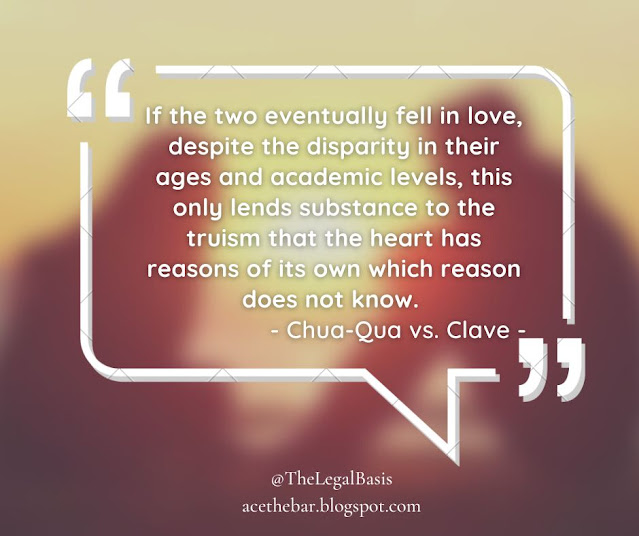CASE DIGEST: EVELYN CHUA-QUA vs. HON. JACOBO CLAVE and TAY TUNG HIGH SCHOOL INC. G.R. No. 49549. August 30, 1990
FACTS:
Petitioner was employed with Tay Tung High School as a teacher. Bobby Qua was then a student under the advisory class of the Petitioner.
The school has this policy to extend remedial instructions to its students. Bobby Qua was then imparted with these remedial instructions by the Petitioner. During the course of their remedial instructions, the teacher and the student eventually fell in love. They got married in a civil ceremony on December 24, 1975, and conducted a church ceremony the following year on January 10, 1976. The marriage was consented to by the parents of Bobby, who at that time was only 16 years of age, while the petitioner was then 30 years old.
This event prompted the school to dismiss the petitioner in her employment as a teacher alleging that she lured her student to enter into an amorous relationship with her. The school contended that her continued employment is inimical to the best interest and would downgrade the high moral values of the school and that she committed abusive and unethical conduct unbecoming of a dignified school teacher.
The school presented a written affidavit of witnesses, stating that they had seen the petitioner and her student inside the classroom without stating, in particular, the immoral conduct that they did within the school premises, particularly in their classroom.
ISSUE:
Whether the facts culminated in the marriage of the petitioner and her student constitutes immorality and grave misconduct to warrant valid dismissal from employment.
RULING:
No, to constitute immorality, the circumstances of each particular case must be holistically considered and evaluated in light of prevailing norms of conduct and the applicable law. The school did not satisfy the substantial evidence required to prove the immorality of the petitioner. The affidavits of witnesses did not directly confirm that the petitioner and her student were doing an immoral act in the classroom. After all, there is a reason why the two were left in their classroom because of the remedial instruction policy of the school.
The school failed to show that the petitioner took advantage of her position to court her student. If the two eventually fell in love, despite the disparity in their ages and academic levels, this only lends substance to the truism that the heart has reasons of its own which reason does not know. But, definitely, yielding to this universal emotion is not to be so casually equated with immorality. The deviation of the circumstances of their marriage from the usual societal pattern cannot be considered a defiance of contemporary social mores.
Hence, the dismissal of the petitioner from her employment was declared unwarranted and illegal.

It's a discrimination to dismiss the employee because she and her student fell in love. There is no proof of the immoral conduct in this case.
ReplyDelete